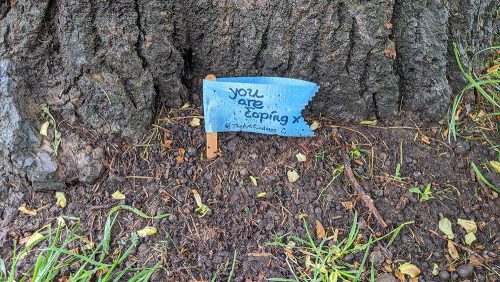April 2020 reading round-up

How do I summarise this month? Aside from the garden, I left the house four times – for two walks and two bike rides. I’m a home body anyway, so most of the time I don’t mind that. But every so often I feel a massive urge to get out and I have so much sympathy for people who can’t go outside easily or even at all right now. It’s hard.
The four-day Easter weekend gave me the chance to kick-start my reading again. I haven’t maintained that intensity of reading, but I am still reading actual books, which is an improvement on most of March.
If you’re not already aware, the National Theatre has been putting some recordings of its shows on YouTube, a different one each week. I’ve so far watched the Sally Cookson production of Jane Eyre and the Simon Godwin production of Twelfth Night, and I fully plan to catch Frankenstein before it disappears next Thursday. I am also really grateful that the BBC and Channel 4 have made a bunch of old TV shows available on their streaming services. We’ve watched a lot of Scrubs. I’ve watched even more films than usual as well. I highly recommend the Ghibli film Nausicaa (Netflix) and the Taika Waititi film Boy (Amazon Prime).
I am hoping that May is less scary in terms of world news. Stay safe!
Books
The Jane Austen Book Club by Karen Joy Fowler
Six people take it in turn to host a book club analysing Jane Austen, themselves and each other. This is a light, gentle read, which was just what I needed at the start of lockdown.
The Reluctant Fundamentalist by Mohsin Hamid
In a Lahore cafe, a local man, Changez has approached an American visitor and offered to act as his guide. Over the evening, Changez tells his story – one that is surprising and seems to be building up to something. He spent a few years living in the USA, thanks to an Ivy League scholarship and an excellent job on the back of that. But then everything changed – in his words, the city he loved and the woman he loved there both betrayed him. This is an excellent, subtle book that manages to be gripping and everyday at the same time.
Loving Sabotage by Amélie Nothomb
translated from French by Andrew Wilson
An “auto fiction” novella about the time Nothomb spent living in China in 1972–1975. She was just five when she moved to a tightly controlled compound in Beijing, filled with diplomats’ families. Dozens of children were largely left to play in the yard with each other whenever they weren’t eating, sleeping or at school. It could have been idyllic, were it not for children’s tendency to be vicious to one another. I love Nothomb and this is an excellent example of her work.
Hons and Rebels by Jessica Mitford
This is Jessica Mitford’s memoir of her early life, which alone is going to be entertaining considering her family. But it gets extra fun because she is debunking the fictionalised version of her story presented in her sister Nancy’s books. I loved this book and now want to read all Jessica’s writings.
Doppelgänger by Daša Drndić
translated from Croatian by SD Curtis and Celia Hawkesworth
This novella is formed of two stories linked by major themes and minor details. In the first, “Artur and Isabella” the eponymous heroes are old and think their days of romance are behind them, until they meet. Drndić doesn’t skimp on the grotesque aspects of ageing, to the point of making me quite uncomfortable. I preferred the second story, “Pupi”, but overall didn’t love this.
Leaving the Yellow House by Saul Bellow
This Penguin Mini Classic is a short story about an old woman Hattie, who has reached the point where she probably should not be living alone anymore, but has nowhere to go. She’s hard drinking, irascible but also fun and colourful. I really enjoyed this, which was my first taste of Bellow.
The Room of Lost Things by Stella Duffy
In this sweet slice-of-life novel, Robert is ready to retire, but he doesn’t want to just close the dry cleaning business that he has run all his life in his beloved corner of south London. So he decides that he will take a year to train up the person who buys it. That someone is Akeel, an ambitious young man from East London. As the two very different men get to know each other, Robert also gives Akeel insights into his regular customers and other neighbourhood personalities.
Barbarella Vol. 1 by Jean-Claude Forest
Translated from French by Kelly Sue Deconnick
This is the original first volume of Barbarella comics published in 1964, in a brand new translation by current comic writer Kelly Sue Deconnick. The story is meandering to the point of nonsensical, and includes a lot of very skimpy outfits on its heroine, and sex as a means of escape. It reminds me to some extent of Modesty Blaise but Barbarella is a less independently super-capable heroine. I’m not convinced the original Barbarella comics could be called feminist or sex-positive, but Deconnick’s translation certainly is. And there’s a lot of fun to be had in all the weird spacefaring antics.